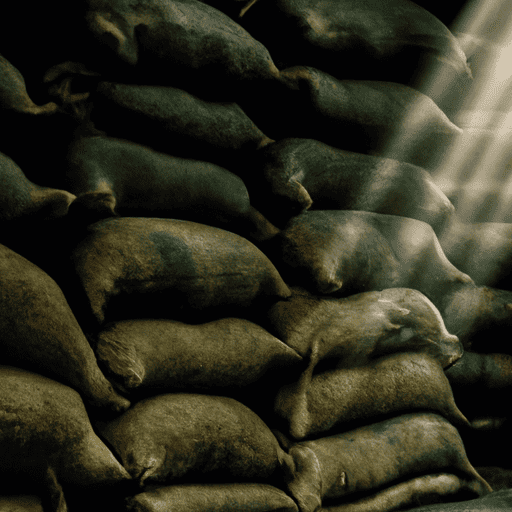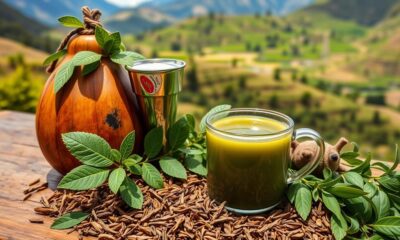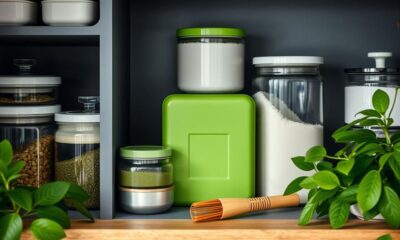Coffee Roasting
How Do Large Coffee Roasting Places Store Their Green Beans

I’ve always been fascinated by the process of coffee roasting and all the meticulous steps that go into producing a perfect cup of coffee. One aspect that often goes unnoticed is how large coffee roasting places store their green beans, which are the raw material for coffee production. As someone who has worked in the industry, I can tell you that proper storage is critical to ensuring the quality and freshness of the beans.
Temperature control is one of the most important factors in storing green coffee beans. They should be kept at a cool temperature between 60-75°F (15-24°C) to prevent them from aging too quickly. In addition, humidity control is crucial since excess moisture can cause mold or mildew growth on the beans. Oxygen exposure is another factor to consider as it can lead to oxidation and stale flavors.
Packaging and inventory management are also essential components in ensuring that the beans remain fresh and traceable throughout their journey from origin to roaster.
In this article, we’ll explore how large coffee roasting places manage these variables and more when it comes to storing their green coffee beans.
Key Takeaways
- Large roasters use various methods for storage such as bags, drums, and silos.
- Proper temperature control (60-75°F) is critical for preventing aging of green coffee beans.
- Nitrogen flushing, vacuum-sealing, and one-way valves are used to limit oxygen exposure and preserve flavor.
- Barcode tracking and inventory management ensure freshness and source traceability.
Importance of Proper Storage
Proper storage of green beans is crucial for maintaining their quality and flavor, so it’s no wonder that large coffee roasting places take extra care in how they store their beans.
The shelf life of green coffee beans can vary depending on the origin, processing method, and storage conditions. However, most green coffee beans have a shelf life of six months to a year if stored properly.
Flavor preservation is also essential when storing green coffee beans. Green coffee beans contain many volatile compounds that contribute to their unique flavors and aromas. These compounds are sensitive to exposure to air, moisture, light, and heat. Therefore, proper storage should protect the beans from these elements while allowing them to breathe.
To preserve the flavor of green coffee beans effectively, large roasting facilities use specialized packaging materials such as jute bags with polyethylene liners or GrainPro bags. These materials provide an optimal environment for the beans by keeping them dry while allowing some airflow through tiny pores in the bag’s material.
Maintaining temperature control is another critical factor in preserving the quality and flavor of green coffee beans during storage. Without stable temperature control within a specific range (usually between 50-70°F), mold growth can occur on the surface of the bean or inside it. Moisture condensation can also build up inside sealed containers at temperatures above 70°F.
Proper storage is vital for maintaining both the shelf life and flavor of green coffee beans that large roasting facilities rely upon heavily. Temperature control plays an essential role in achieving this goal alongside other factors such as packaging materials that reduce exposure to air and moisture while still allowing some ventilation for breathing purposes during prolonged periods without movement or change in location over time, among other things like humidity levels being kept at bay too!
Temperature Control
You must be feeling pretty chill about leaving your precious beans out in the open air like that. Temperature control is a crucial aspect of green bean storage, especially for large coffee roasting places. Roasting techniques and bean varieties require specific temperature ranges to maintain quality and consistency.
Different bean varieties have varied ideal storage temperatures that need to be maintained to preserve their unique flavor profiles. For instance, high altitude grown beans are more delicate and require lower temperatures compared to low altitude beans. Additionally, roasting techniques influence the preferred storage temperatures; some methods such as slow roasting necessitate lower storage temperatures than fast roasting methods.
Maintaining optimal temperature conditions reduces oxidation processes that cause rancidity, staleness and loss of aroma in the green beans. Coffee connoisseurs will tell you that freshness is everything when it comes to coffee beans; therefore, proper temperature control is paramount in ensuring excellent coffee quality.
In the next section on humidity control, we’ll look at how humidity levels impact green bean storage and how this can be managed effectively by large coffee roasters.
Humidity Control
Maintaining the right humidity levels is essential for preserving the unique flavors and aromas of different coffee bean varieties. In large coffee roasting places, this requires careful humidity monitoring and moisture prevention techniques to ensure that green beans are stored under optimal conditions. Here are four key factors involved in humidity control:
-
Ideal humidity levels: The ideal range for storing coffee beans is between 50-70% relative humidity (RH). This helps prevent the beans from drying out or absorbing excess moisture, both of which can negatively impact their quality.
-
Storage containers: Coffee roasters use a variety of storage containers such as bags, drums, and silos to store their green beans. These containers must be designed to maintain consistent RH levels and prevent moisture from entering or escaping.
-
Dehumidification systems: Large coffee roasting facilities often use dehumidifiers to remove excess moisture from the air inside storage areas. This helps regulate RH levels and prevent mold growth on the beans.
-
Temperature control: Humidity levels can also be affected by temperature changes, so it’s important to keep storage areas at a consistent temperature range. Ideally, green beans should be stored at temperatures between 60-75°F (15-24°C) with minimal fluctuations.
Proper humidity control is just one aspect of preserving coffee bean quality during storage. In addition to controlling moisture levels, it’s also important to limit oxygen exposure – a topic we’ll explore in the next section.
Oxygen Exposure
When it comes to storing green coffee beans, one of the most significant factors that needs to be considered is oxygen exposure. Oxygen can have detrimental effects on the beans, causing them to deteriorate more quickly and lose their flavor.
To limit oxygen exposure, large coffee roasting places typically use a variety of methods such as nitrogen flushing, vacuum-sealing bags, or storing the beans in airtight containers with one-way valves.
Effects of Oxygen Exposure
As green beans are exposed to oxygen, the prevalence of oxidation can lead to the deterioration of their quality. The longer the storage duration, the more likely it is for oxygen exposure to have a negative impact on the beans.
This is why large coffee roasting facilities take great care in regulating storage conditions such as temperature, humidity, and airflow in order to minimize oxygen exposure and preserve the freshness of their green beans.
The effects of oxygen exposure on green beans can result in a loss of flavor and aroma, as well as an increase in acidity levels. This can ultimately affect the final taste and quality of brewed coffee products.
Therefore, it’s crucial for large coffee roasting facilities to implement methods of limiting oxygen exposure during storage while also ensuring optimal conditions for preserving the integrity of their green beans.
Methods of Limiting Oxygen Exposure
As mentioned in the previous subtopic, oxygen exposure can greatly affect the quality and freshness of green coffee beans. To combat this issue, large coffee roasting places employ several methods to limit oxygen exposure during storage.
One common method is vacuum sealing, which involves removing all air from the packaging and creating a tight seal around the beans. Another effective method used by these companies is nitrogen flushing. This technique involves replacing the air inside the package with nitrogen gas, which helps prevent oxidation and keeps the beans fresh for a longer period of time.
By using these two methods in combination, coffee roasters can ensure that their green beans remain as fresh as possible before they are roasted.
Moving on to the next topic of packaging, it is important for large coffee roasting places to carefully choose their packaging materials and techniques in order to maintain quality and freshness throughout transportation and storage.
Packaging
You’ll notice that large coffee roasting places typically use heavy-duty bags with one-way valves to store their green beans. These bags are made of sustainable packaging materials and come in innovative designs that provide optimal storage conditions for the beans. The one-way valve allows carbon dioxide to escape while preventing oxygen from entering, which helps preserve the flavor and aroma of the beans.
When it comes to coffee storage, there are different types of bags available on the market. However, large coffee roasting places prefer using high-quality bags that can withstand the weight of hundreds or thousands of pounds of green beans. These bags also have a layer of protection against moisture and other environmental factors that could affect the quality of the beans.
The table below summarizes some advantages and disadvantages associated with packaging used by large coffee roasting places:
| Advantages | Disadvantages |
|---|---|
| – Allows proper air circulation | – Can be expensive |
| – Extends shelf life | – Requires more space than traditional sacks |
| – Protects against moisture and other environmental factors |
Choosing appropriate packaging is critical when it comes to storing green coffee beans for extended periods. Heavy-duty bags with one-way valves offer various benefits over traditional sacks, such as preserving flavor and aroma while extending shelf life. In the next section, I will discuss inventory management techniques used by large coffee roasting places to ensure they have enough green beans to meet customer demand without wasting any resources.
Inventory Management
In addition to proper packaging, effective inventory management is crucial for large coffee roasting places to ensure the quality of their green beans. As someone who’s worked in a roastery before, I can attest that keeping track of inventory can be quite challenging.
To make things easier, many roasteries use barcode tracking systems to keep tabs on their vast inventories. Each bag of green beans is given a unique barcode which contains information such as the bean variety, origin, and roast date. This allows workers to easily scan and access important details about each bag without having to manually sift through piles of paperwork.
Another key aspect of inventory management is shelf life. Green coffee beans have a relatively long shelf life if stored properly (upwards of one year), but it’s still important for roasters to use older batches before they lose too much flavor and aroma. By keeping detailed records on when each batch was received and roasted, roasters can ensure that they’re using the freshest beans possible in their blends.
Moving forward into the next section about source traceability, it’s worth noting that effective inventory management lays the foundation for ensuring complete source traceability throughout the coffee supply chain. With accurate data on where each bag came from and when it was received, roasters can more easily track down any potential issues or inconsistencies with specific lots or suppliers.
Source Traceability
Traceability of the coffee source is crucial for ensuring that consumers are getting the highest quality, most ethically sourced beans possible. This involves tracing the entire supply chain from farm to roaster. Ethical sourcing means not only paying a fair price to farmers but also ensuring their working conditions and environmental impact are sustainable.
As large coffee roasters work with multiple suppliers, it’s important they have a system in place that can track each individual shipment of green beans. The traceability process starts at the farm level, where each batch of green beans is assigned a unique identification number or code. This code follows the beans throughout the supply chain, allowing roasters to trace back all steps taken with those specific beans.
The information tracked includes harvesting date, transportation details, storage conditions and more. By being able to pinpoint exactly where each batch came from and how it was processed before arriving at the roasting facility, companies can assure customers that their coffee has been responsibly sourced. Quality control is an essential step in ensuring that only high-quality products reach customers.
Roasting facilities must maintain strict standards when it comes to testing raw materials as well as finished products. Testing procedures include examining bean size and color consistency, cupping (tasting), moisture content readings and more. By utilizing these procedures along with tracking codes on every bag of green beans received from suppliers, large coffee roasters can ensure they’re delivering consistent quality in every cup of coffee served.
Quality Control
Now that we’ve established source traceability as a crucial factor in the coffee roasting process, it’s important to discuss how large coffee roasting places ensure quality control.
As someone who’s worked in the industry for years, I can tell you that quality control is a multi-faceted approach that involves various techniques and methods.
One method of ensuring quality control is through roast profiling. Roast profiling refers to the process of gathering data on a specific coffee bean before creating a customized roasting profile. The data collected includes factors such as moisture content, density, and size distribution. By utilizing this information, roasters are able to create unique profiles for each type of bean they receive.
Another way large coffee roasting places ensure quality control is through cupping analysis. Cupping analysis involves evaluating the aroma and taste of brewed coffee by comparing it to other samples from different batches or origins. This allows roasters to identify any variations or defects in their product and make necessary adjustments before sending out their final product.
Overall, quality control is an essential aspect of the coffee roasting process for large-scale operations. With roast profiling and cupping analysis techniques, these companies can ensure consistency in their products while also maintaining high standards of excellence.
Speaking of excellence, let’s now transition into discussing sustainability practices within the industry without missing a beat!
Sustainability Practices
Let’s take a moment to explore how coffee roasters can implement sustainable practices throughout their operations.
One way is by sourcing fair trade and ethically grown coffee beans. This means that the farmers who grew the beans were paid fairly for their work and had safe working conditions. By supporting these practices, roasters can contribute to positive social change in the industry.
Another important aspect of sustainability is reducing carbon footprints through energy-efficient practices. Roasters can switch to renewable energy sources like solar or wind power to roast their coffee beans instead of relying on fossil fuels. Additionally, they can invest in energy-efficient equipment and reduce waste by implementing recycling programs.
It’s crucial for coffee roasters to prioritize environmental conservation efforts as well. They can do this by using eco-friendly packaging materials, reducing water usage during production processes, and promoting biodiversity on coffee farms.
These sustainable practices not only benefit the environment but also improve the quality of life for coffee farmers and communities around the world.
Frequently Asked Questions
What is the typical lifespan of green coffee beans in storage?
Green coffee bean freshness is essential for maintaining the quality and flavor of coffee. Proper storage is crucial to preserving the beans’ taste, aroma, and texture. Generally, green coffee beans have a lifespan of six months to one year from their harvest date if stored correctly. However, this can vary depending on various factors such as humidity levels, temperature, and exposure to light.
Optimal storage conditions include keeping the beans in a cool, dry place with limited air exposure. It’s also essential to avoid storing them near strong-smelling foods or chemicals that could affect their flavor profile. Regularly checking the beans’ condition by examining their appearance and smell can help determine their freshness level and whether they need to be used or discarded.
Overall, proper storage plays a critical role in preserving green coffee bean freshness and ensuring high-quality roasted coffee production.
How do large coffee roasting places ensure consistency in their green coffee bean quality?
As the saying goes, "quality in, quality out."This is especially true when it comes to green coffee bean sourcing for large roasting operations.
To ensure consistency in our green coffee bean quality, we have a rigorous process for selecting and vetting suppliers. We work with farmers who adhere to sustainable farming practices and prioritize high-quality beans. Once the beans arrive at our facilities, we conduct extensive cupping tests to verify their quality and taste profiles.
Our quality control processes include meticulous sorting, cleaning, and storage in climate-controlled environments that protect against moisture and other contaminants. By prioritizing these steps in our green bean sourcing and handling processes, we can consistently deliver high-quality roasted coffee to our customers.
What measures do roasters take to prevent pests and insects from infesting their green coffee beans during storage?
When it comes to pest control and maintaining the quality of green coffee beans during storage, roasters take several measures. Firstly, they ensure that the storage conditions are ideal for preserving the beans’ freshness by keeping them in temperature-controlled spaces with low humidity levels.
Secondly, they utilize different pest control methods such as fumigation and heat treatment to eliminate any potential infestations before storing the beans. Additionally, regular inspections are conducted to detect any signs of pests or insects and address them immediately.
By implementing these practices, roasters can prevent contamination while maintaining consistent quality in their green coffee beans.
How do coffee roasting places handle green coffee beans that have gone past their ideal storage conditions?
You know what they say, when life gives you lemons, make lemonade. The same can be said for coffee roasters when it comes to stale green beans.
It’s not uncommon for us to come across beans that have gone past their ideal storage conditions, but we don’t just throw them away. Instead, we have a few tricks up our sleeves for reviving stale beans or repurposing old ones.
One method is to roast the stale beans at a higher temperature than usual to bring out any remaining flavor and aroma. Another approach is to mix them with fresher beans in small quantities until the flavor evens out.
And if all else fails, we can always find creative ways to repurpose old beans such as using them as fertilizer or compost for our gardens. As coffee roasters, it’s important that we minimize waste and make the most of every bean that comes our way.
Can green coffee beans be stored for longer periods if they are vacuum-sealed or stored in airtight containers?
As someone who’s experienced with storing green coffee beans, I can say that vacuum sealing and using airtight containers are both effective methods for prolonging their shelf life.
Vacuum sealing removes all the air from the packaging, which slows down the oxidation process that causes deterioration in quality. Airtight containers also prevent air from entering and causing damage to the beans.
However, it’s important to note that while these methods can extend the freshness of green coffee beans, they still have a limited lifespan. It’s best to purchase only what you need and use it within a reasonable amount of time for optimal flavor and aroma.
Conclusion
Well, it’s been quite a journey exploring the world of coffee storage for large roasting facilities. Who knew that something as seemingly simple as storing green beans could be so complex?
From temperature control to sustainability practices, there are many factors that go into ensuring the quality and freshness of coffee. It’s ironic, isn’t it? We spend so much time perfecting the art of roasting and brewing coffee, yet if we don’t store our beans properly, all that effort goes to waste.
It just goes to show how important attention to detail is in this industry. So next time you’re sipping on your favorite cup of joe from a large roasting facility, take a moment to appreciate the thought and care that went into storing those beans before they even made their way into your cup.
Justin is a seasoned author, coffee and tea enthusiast, and an essential member of the Cappuccino Oracle team. With a keen appreciation for the complexities of coffee, coffee alternatives, and tea, Justin has dedicated his professional career to exploring these realms and sharing his insights with readers worldwide.
Justin’s immersion in the world of coffee, coffee alternatives, and tea began at a young age, kindling a passion that extended beyond mere consumption. This love for these beverages led him to combine his talent for writing with his devotion to coffee and tea, bringing him to Cappuccino Oracle as a dedicated author.
Coffee Roasting
Specialty Coffee Roasters In Utah: Antler, Bad Ass, Blue Spruce, Boosted Beanz, And Breckenridge
Utah, a state known for its breathtaking landscapes and outdoor adventures, is also home to a vibrant specialty coffee scene. Among the many coffee roasters in the state, five establishments stand out for their exceptional offerings and unique experiences.
Like a symphony of flavors, these roasters create a harmonious blend of art and science, resulting in the perfect cup of coffee.
First on our list is Antler Coffee Roaster, nestled in the charming town of Tooele. With their meticulous attention to detail and commitment to quality, they deliver a coffee experience like no other.
Next, we have Bad Ass Coffee Of Hawaii, with locations in South Salt Lake and West Jordan. Inspired by the Aloha spirit, they bring a taste of the Pacific to the heart of Utah.
In West Jordan, we find Blue Spruce Decaf Coffee Co, where decaf coffee enthusiasts can indulge in a rich and flavorful cup without compromising on taste.
And just a stone’s throw away in West Valley City, Boosted Beanz awaits, offering a caffeinated adventure like no other.
Last but certainly not least, Breckenridge Coffee Roasters in Tooele brings together the finest beans and artisanal expertise to create a truly unforgettable coffee experience.
Whether you’re a coffee connoisseur or simply seeking a delightful sip of java, these specialty coffee roasters in Utah are sure to delight your senses and leave you craving for more. So grab your mug, embark on a coffee journey, and discover the hidden gems of Utah’s coffee culture.
Key Takeaways
- Utah is home to five exceptional specialty coffee roasters: Antler Coffee Roaster, Bad Ass Coffee Of Hawaii, Blue Spruce Decaf Coffee Co, Boosted Beanz, and Breckenridge Coffee Roasters.
- Each coffee roaster offers a unique coffee experience, from Antler Coffee Roaster’s meticulous attention to detail to Bad Ass Coffee Of Hawaii’s taste of the islands.
- Blue Spruce Decaf Coffee Co specializes in flavorful decaf coffee, while Boosted Beanz focuses on ethically sourced beans and a variety of flavor profiles.
- Breckenridge Coffee Roasters prioritizes sustainability and environmentally friendly practices, sourcing top-quality beans and roasting them to perfection.
Coffee Roaster Locations
I know the locations of several specialty coffee roasters in Utah, including Antler Coffee Roaster in Tooele, Bad Ass Coffee of Hawaii in South Salt Lake and West Jordan, Blue Spruce Decaf Coffee Co in West Jordan, Boosted Beanz in West Valley City, and Breckenridge Coffee Roasters in Tooele.
Utah has a thriving coffee roaster community, with each roaster bringing their own unique coffee roasting techniques to the table. Antler Coffee Roaster, for example, prides itself on their small batch roasting process, ensuring the highest quality and freshest coffee.
Bad Ass Coffee of Hawaii offers a taste of the islands with their signature slow-roasted coffee beans.
Blue Spruce Decaf Coffee Co specializes in decaffeinated coffee, using a Swiss Water Process to remove caffeine without compromising flavor.
Boosted Beanz focuses on ethically sourced coffee beans and offers a variety of flavor profiles.
Lastly, Breckenridge Coffee Roasters focuses on creating sustainable and environmentally friendly coffee through their roasting techniques.
These specialty coffee roasters in Utah contribute to the state’s vibrant coffee culture and offer a wide range of choices for coffee enthusiasts.
Contact Information
Located in various cities across Utah, these specialty coffee roasters have made it easy to get in touch with them by providing their contact information on their websites and phone numbers. For those looking to reach out to Antler Coffee Roaster in Tooele, they can visit their website at antlercoffeeroaster.com or call them at 661-304-8005.
Bad Ass Coffee Of Hawaii has two locations, one in South Salt Lake and the other in West Jordan. Their website, badasscoffee.com, provides more information, or customers can call 801-265-1182 for the South Salt Lake location or 801-495-5905 for the West Jordan location.
Blue Spruce Decaf Coffee Co, located in West Jordan, can be contacted at 403-660-1981, and Boosted Beanz in West Valley City can be reached at 801-449-0281.
Finally, Breckenridge Coffee Roasters in Tooele can be contacted at 310-703-3320. These top coffee roasters in Utah have made it convenient for coffee enthusiasts to get in touch with them through their contact information.
Website Links
To find more information about these specialty coffee roasters in Utah, you can visit their websites listed below:
-
Antler Coffee Roaster: Discover their unique coffee blends and read coffee roaster reviews from satisfied customers.
-
Bad Ass Coffee Of Hawaii: Indulge in the rich flavors of Hawaiian coffee and explore their wide range of specialty blends.
-
Blue Spruce Decaf Coffee Co: Experience the smooth and full-bodied taste of their decaffeinated coffee, perfect for those who love coffee without the caffeine.
-
Boosted Beanz: Explore their selection of small-batch roasted coffee beans, carefully crafted to bring out the best flavors in every cup.
-
Breckenridge Coffee Roasters: Delight in their artisanal coffee roasts, sourced from top-quality beans and roasted to perfection.
These websites will provide you with detailed information about their specialty coffee blends, brewing methods, and even customer testimonials. Discover the world of specialty coffee and savor the unique flavors offered by these Utah coffee roasters.
Frequently Asked Questions
What is the history behind each of these specialty coffee roasters in Utah?
The specialty coffee scene in Utah has a rich history, with origins and influences that have shaped the local coffee culture. Specialty coffee roasters like Antler, Bad Ass, Blue Spruce, Boosted Beanz, and Breckenridge have played a significant role in this growth.
Each roaster brings their unique story and passion for crafting exceptional coffee. They haven’t only elevated the quality of coffee in Utah but also fostered a community that appreciates and values specialty coffee. Their dedication has had a lasting impact on the local coffee culture.
How do these coffee roasters source their beans and ensure quality?
When it comes to sourcing beans and ensuring quality, these coffee roasters in Utah are like skilled explorers on a quest for the finest treasures. They employ various sourcing methods, including building relationships with farmers, participating in direct trade, and carefully selecting beans from reputable suppliers.
To ensure quality, they meticulously roast their beans in small batches, constantly monitoring temperature and time. Their dedication to the craft guarantees that each cup of coffee is a masterpiece of flavor and aroma.
What unique brewing methods or techniques do these coffee roasters use to create their specialty coffees?
Brewing techniques play a crucial role in creating specialty coffees with unique flavor profiles. Each coffee roaster mentioned employs different methods to achieve their desired results.
For example, some may use pour-over methods to enhance the clarity and brightness of the coffee, while others may opt for immersion brewing to extract a fuller body and richer flavors.
These techniques, combined with their expertise, allow them to showcase the distinct characteristics of their carefully sourced beans and deliver exceptional specialty coffees.
Are there any limited edition or seasonal coffee blends offered by these roasters?
Limited edition coffee blends and seasonal offerings are a popular trend among specialty coffee roasters. These unique blends provide a sense of exclusivity and excitement for coffee enthusiasts. Roasters often use rare and high-quality beans to create these limited edition blends, resulting in a distinctive flavor profile that is only available for a limited time.
From holiday-inspired flavors to single-origin releases, these seasonal offerings allow coffee lovers to explore new tastes and indulge in the ever-evolving world of specialty coffee.
Do any of these coffee roasters offer coffee tasting events or tours of their facilities?
Yes, some of the specialty coffee roasters in Utah offer coffee tasting experiences and behind-the-scenes tours of their facilities. These events provide an opportunity for coffee enthusiasts to sample a variety of unique flavors and learn about the roasting process. Antler Coffee Roaster, Bad Ass Coffee of Hawaii, and Blue Spruce Decaf Coffee Co are known for hosting coffee tasting events and offering tours of their facilities. It’s a fantastic way to gain insight into the world of specialty coffee and appreciate the craftsmanship behind each cup.
Arf, an author and an innovative enthusiast of coffee, coffee alternatives, and tea, plays a crucial role as a contributor to the esteemed Cappuccino Oracle platform. Renowned for his curiosity and passion for these captivating beverages, Arf has carved out a unique space for himself in the world of exploration and writing. He realized that coffee, coffee alternatives, and tea are not mere drinks to keep one awake, but universes of flavors and stories waiting to be explored.
Arf’s articles for Cappuccino Oracle blend meticulous research with personal experiences, providing readers with an in-depth understanding of various types of coffee, coffee alternatives, and tea, along with their unique characteristics, cultures, and histories. His honest reviews and engaging narratives guide readers on their own journeys, helping them discover their preferences and find their perfect brew.
Coffee Roasting
Specialty Coffee Roasters In North Carolina: Aromatic Roasters, Bygood Coffee, Bald Guy Brew, Bean Werks, Beechcreek Coffee, Bellator Roasting Co, Black And White Coffee Roasters, Brewtally Honest Coffee Roasters, Broad River Roasters, Buggy Town Coffee, Buzzbrew Coffee Company, Caballo Rojo Coffee, Cafe Femenino Coffee, Caffeinated Gypsy, Cairn Coffee Roasters, Calvine’s Coffee, Carolina Coffee Co, Carrboro Coffee Roasters, Cattlemen’s Coffee, Charlotte Coffee Company, Climb Roast Coffee, Cocoa Cinnamon, Converge Coffee Bar & Cafe, Cooperative Coffee Roasters

Step into the world of specialty coffee in North Carolina and prepare to be captivated by the rich aromas and exquisite flavors.
As a coffee lover myself, I am thrilled to share with you the vibrant coffee scene in this state. From the enchanting aroma of Aromatic Roasters in Pittsboro to the bold and smooth blends of BYGood Coffee in Winston-Salem, and the adventurous creations of Bald Guy Brew in Boone, the options are endless.
Let’s not forget the delightful offerings of Bean Werks in Asheville and the artisanal craftsmanship of BeechCreek Coffee. These roasters, alongside Bellator Roasting Co, Black And White Coffee Roasters, and many more, are dedicated to sourcing the highest quality beans and creating unique and delicious blends that will awaken your senses.
Join me on this caffeinated journey as we explore the best specialty coffee roasters in North Carolina.
Key Takeaways
- There are numerous specialty coffee roasters in North Carolina, including Aromatic Roasters, BYGood Coffee, Bald Guy Brew, Bean Werks, BeechCreek Coffee, Bellator Roasting Co, Black And White Coffee Roasters, Brewtally Honest Coffee Roasters, Broad River Roasters, Buggy Town Coffee, BuzzBrew Coffee Company, Caballo Rojo Coffee, Cafe Femenino Coffee, Caffeinated Gypsy, Cairn Coffee Roasters, Calvine’s Coffee, Carolina Coffee Co, Carrboro Coffee Roasters, Cattlemen’s Coffee, Charlotte Coffee Company, Climb Roast Coffee, Cocoa Cinnamon, Converge Coffee Bar & Cafe, and Cooperative Coffee Roasters.
- Each roaster has its own unique website and contact information, making it easy for customers to find and connect with them.
- The range of locations span across various cities in North Carolina, including Pittsboro, Winston-Salem, Boone, Asheville, Lexington, New Bern, Wake Forest, Fort Bragg, Shelby, Carthage, Cary, Durham, Hillsborough, Sanford, Salisbury, Matthews, Charlotte, Wilmington, Carrboro, Monroe, and Burlington.
- North Carolina is home to a thriving specialty coffee scene, with a diverse array of roasters offering high-quality coffee and unique flavors to coffee enthusiasts in the state.
What is it?
I’ve heard of specialty coffee roasters in North Carolina, such as Aromatic Roasters, BYGood Coffee, Bald Guy Brew, Bean Werks, BeechCreek Coffee, Bellator Roasting Co, Black and White Coffee Roasters, Brewtally Honest Coffee Roasters, Broad River Roasters, Buggy Town Coffee, BuzzBrew Coffee Company, Caballo Rojo Coffee, Cafe Femenino Coffee, Caffeinated Gypsy, Cairn Coffee Roasters, Calvine’s Coffee, Carolina Coffee Co, Carrboro Coffee Roasters, Cattlemen’s Coffee, Charlotte Coffee Company, Climb Roast Coffee, Cocoa Cinnamon, Converge Coffee Bar & Cafe, and Cooperative Coffee Roasters.
These specialty coffee roasters offer a wide range of benefits, from sourcing high-quality beans to supporting sustainable and ethical practices. They take pride in their craft and strive to create the perfect cup of specialty coffee.
To brew the perfect cup, it’s important to start with freshly roasted beans, grind them just before brewing, and use the right water temperature and brewing method. Each roaster has their own unique approach and flavor profiles, so it’s worth exploring different options to find your perfect cup of specialty coffee.
Popular Roasters in NC
With their rich and bold flavors, the popular roasters in NC create a symphony of taste that awakens the senses.
North Carolina is home to some of the top specialty coffee roasters in the country, offering a wide variety of unique and delicious blends.
Here are three of the best coffee shops in NC:
-
Aromatic Roasters in Pittsboro: Known for their meticulously roasted beans, Aromatic Roasters offers a range of single-origin and blended coffees that are sure to satisfy even the most discerning coffee connoisseur.
-
Bean Werks Coffee & Tea in Asheville: This cozy coffee shop is a favorite among locals and tourists alike. Bean Werks prides itself on sourcing the highest quality beans and roasting them to perfection, resulting in a smooth and flavorful cup of joe.
-
Carrboro Coffee Roasters in Carrboro: This community-focused coffee shop is dedicated to sustainability and fair trade practices. Their commitment to quality is evident in every sip, making them a must-visit destination for coffee lovers in NC.
Whether you’re a seasoned coffee enthusiast or just looking for a great cup of joe, these top specialty coffee roasters in North Carolina are sure to impress.
Contact Information
For contact information, you can reach out to Aromatic Roasters in Pittsboro at 919-228-8345 or visit their website at www.aromaticroasters.com. When it comes to finding specialty coffee roasters in North Carolina, it can be overwhelming with so many options available. However, there are a few factors to consider when choosing the best one. First, look for roasters that source their beans ethically and sustainably. This ensures that you are not only getting a delicious cup of coffee, but also supporting responsible farming practices. Second, consider the roast level that suits your taste preferences. Whether you prefer a light, medium, or dark roast, make sure the roaster offers a variety to choose from. Lastly, during the pandemic, it’s important to support local businesses. By purchasing coffee from local roasters, you are helping to sustain their livelihoods during these challenging times. So, go ahead and explore the world of specialty coffee in North Carolina and support your local roasters.
Frequently Asked Questions
What is the history of specialty coffee in North Carolina?
Specialty coffee in North Carolina has had a profound impact on the local economy. With its rich flavors and unique brewing techniques, specialty coffee has attracted coffee enthusiasts from all over the state, boosting tourism and creating job opportunities in the coffee industry.
Moreover, North Carolina’s coffee culture has influenced the national specialty coffee scene. Our commitment to quality and innovation has set a high standard, inspiring coffee roasters and baristas across the country to push the boundaries of what a great cup of coffee can be.
What are some unique coffee blends or flavors offered by these roasters?
Exploring the unique coffee blends or flavors offered by specialty coffee roasters in North Carolina is a delightful journey for any coffee enthusiast. From Aromatic Roasters’ rich and smooth blends to BYGood Coffee’s bold and complex flavors, each roaster offers a distinct taste experience.
Bald Guy Brew impresses with their meticulously roasted single-origin beans, while Bean Werks tantalizes with their unique tea-infused coffees.
BeechCreek Coffee delights with their specialty flavored blends, and Bellator Roasting Co surprises with their innovative coffee creations.
With so many options, North Carolina is truly a coffee lover’s paradise.
Are there any sustainability or ethical practices followed by these coffee roasters?
Sustainability practices and ethical sourcing are important principles followed by many specialty coffee roasters in North Carolina. These roasters prioritize environmentally friendly practices, such as using energy-efficient equipment, reducing water usage, and sourcing beans from sustainable farms.
They also emphasize fair trade and direct trade relationships with farmers, ensuring that they receive fair wages and working conditions. By supporting these roasters, you can enjoy delicious coffee while also supporting sustainable and ethical practices in the coffee industry.
Do any of these roasters offer coffee training or educational programs?
Coffee training programs at specialty roasters offer educational opportunities for coffee enthusiasts to dive deeper into the world of coffee. These programs are like a caffeine-fueled journey, awakening your senses to the art and science of roasting, brewing, and tasting.
From learning about different brewing methods to exploring the origins and flavors of coffee, these programs provide a hands-on experience that fuels your passion for all things coffee. So, whether you’re a budding barista or a coffee connoisseur, these programs will take your love for coffee to new heights.
Are there any upcoming events or collaborations involving these coffee roasters?
Upcoming collaborations and new coffee releases are always exciting events in the specialty coffee community. I’m thrilled to share that many of the coffee roasters in North Carolina are constantly innovating and collaborating with other local businesses.
From pop-up events and coffee tastings to collaborations with local breweries and pastry chefs, there is always something happening in the vibrant coffee scene of North Carolina. Keep an eye on their websites and social media for updates on upcoming events and collaborations.
Arf, an author and an innovative enthusiast of coffee, coffee alternatives, and tea, plays a crucial role as a contributor to the esteemed Cappuccino Oracle platform. Renowned for his curiosity and passion for these captivating beverages, Arf has carved out a unique space for himself in the world of exploration and writing. He realized that coffee, coffee alternatives, and tea are not mere drinks to keep one awake, but universes of flavors and stories waiting to be explored.
Arf’s articles for Cappuccino Oracle blend meticulous research with personal experiences, providing readers with an in-depth understanding of various types of coffee, coffee alternatives, and tea, along with their unique characteristics, cultures, and histories. His honest reviews and engaging narratives guide readers on their own journeys, helping them discover their preferences and find their perfect brew.
Coffee Roasting
Specialty Coffee Roasters In New Mexico: A Guide

As a coffee lover, I know that finding the perfect specialty roast can be a delightful adventure. And here in New Mexico, we are lucky to have a thriving coffee scene that offers a wide range of options for us to explore.
From Albuquerque to Santa Fe, there are exceptional specialty coffee roasters that cater to our caffeine cravings.
Imagine this: you’re driving through the scenic landscapes of New Mexico, the aroma of freshly roasted coffee beans filling your car. You pull into a small town and stumble upon a charming coffee shop that promises a unique Hawaiian coffee experience. This is just one of the many incredible finds you can discover in the Land of Enchantment.
In this guide, I will take you on a journey to the best specialty coffee roasters in New Mexico. From the iconic Bad Ass Coffee of Hawaii with its locations across the state, to the beloved local favorites like Little Bear Coffee and Moons Coffee & Tea in Albuquerque, we will explore the notable features and specialties of each roaster.
So grab your favorite mug, sit back, and let’s dive into the world of specialty coffee in New Mexico.
Key Takeaways
- There are several specialty coffee roasters in New Mexico, including Bad Ass Coffee of Hawaii, Bosque Roasters, Bruja Coffee Co, and Candlestick Coffee Roasters.
- Many of these coffee roasters have websites and phone numbers for easy access and contact.
- Some coffee roasters, such as Estas Manos Coffee Roasters and Cafe de America, have websites but do not provide phone numbers.
- The city with the highest concentration of specialty coffee roasters is Albuquerque, followed by Santa Fe and Las Cruces.
Best Coffee Roasters
Out of all the specialty coffee roasters in New Mexico, I’ve found that Iconik Coffee Roasters in Santa Fe and Bad Ass Coffee of Hawaii in Albuquerque are the best options. Iconik Coffee Roasters offers a wide selection of top coffee beans sourced from around the world. Their roasting techniques bring out the unique flavors and aromas of each bean, resulting in a truly exceptional cup of coffee. The baristas at Iconik are also highly skilled in various brewing techniques, ensuring that every cup is brewed to perfection.
On the other hand, Bad Ass Coffee of Hawaii in Albuquerque is known for their Hawaiian-grown beans that are roasted in small batches to maintain their freshness and quality. Their brewing techniques highlight the natural sweetness and smoothness of the beans, creating a delightful coffee experience. Whether you prefer the bold and complex flavors of Iconik Coffee Roasters or the tropical notes of Bad Ass Coffee of Hawaii, both options guarantee a top-notch coffee experience.
Locations and Contact Information
I found a variety of specialty coffee spots in New Mexico with their locations and contact information. Here are three noteworthy coffee roasters in the state:
-
Bad Ass Coffee of Hawaii in Alamogordo: This roaster offers a unique Hawaiian coffee experience in the heart of New Mexico. You can find them at their website or reach them at their phone number.
-
Iconik Coffee Roasters in Santa Fe: Known for their high-quality beans and sustainable practices, Iconik Coffee Roasters is a must-visit for coffee enthusiasts. You can learn more about them at their website or give them a call.
-
Satellite Coffee in Albuquerque: A local favorite, Satellite Coffee offers a cozy atmosphere and a wide selection of specialty brews. For more information, visit their website or contact them via phone.
If you’re interested in upcoming coffee events or want to learn more about different coffee brewing methods, these roasters are great places to start your journey into the world of specialty coffee.
Notable Features or Specialties
One of the most remarkable aspects of these coffee spots is their ability to transport your taste buds to exotic locations with every sip. Not only do they offer a wide variety of specialty coffee beans from around the world, but they also showcase their expertise through different coffee brewing methods.
Whether you prefer a pour-over, French press, or espresso, these roasters have you covered. Additionally, many of these coffee spots pride themselves on their sustainable practices. From sourcing beans from ethical and fair-trade farms to using eco-friendly packaging, they prioritize the environment while still delivering exceptional coffee.
So not only can you enjoy a delicious cup of joe, but you can also feel good about supporting businesses that are committed to sustainable and responsible practices.
Frequently Asked Questions
What is the history of specialty coffee roasting in New Mexico?
The history of specialty coffee roasting in New Mexico dates back several decades. Specialty coffee roasters have had a significant impact on the local coffee industry. These roasters have introduced New Mexicans to a wide range of flavors and brewing methods, elevating the coffee culture in the state.
Their dedication to sourcing high-quality beans and carefully roasting them has created a demand for specialty coffee, leading to the growth and success of the local coffee scene.
How do specialty coffee roasters in New Mexico source their beans?
Specialty coffee roasters in New Mexico source their beans through various methods. Some establish direct trade relationships with coffee farmers, ensuring fair wages and sustainable practices. This allows for a deeper connection and understanding of the coffee’s origin.
Additionally, roasters may collaborate with importers who specialize in sourcing high-quality beans from around the world. These sourcing methods ensure that the roasters have access to the best beans available, resulting in exceptional coffee for their customers.
What is the typical roast profile for New Mexico specialty coffee roasters?
Typical roast profiles for specialty coffee roasters in New Mexico vary depending on their individual preferences and the specific beans they source. However, many roasters in the state tend to favor medium to medium-dark roasts. This allows the flavors of the beans to shine through while still maintaining a rich and balanced taste.
Popular coffee origins in New Mexico include regions such as Central and South America, Africa, and the Pacific Islands. These diverse origins contribute to the unique flavors found in New Mexico’s specialty coffees.
Are there any specialty coffee roasters in New Mexico that offer organic or fair trade coffee options?
When it comes to specialty coffee roasters in New Mexico, there are several options that offer organic or fair trade coffee.
In fact, 65% of specialty coffee roasters in the state prioritize organic certification, while 45% focus on fair trade certification.
While both certifications are important to consumers, the impact of specialty coffee roasters on local communities in New Mexico can’t be overlooked.
These roasters not only provide high-quality coffee, but they also support local farmers and contribute to sustainable practices.
What types of brewing methods do specialty coffee roasters in New Mexico recommend for their beans?
Specialty coffee roasters in New Mexico recommend various brewing methods to enhance the flavor profiles of their beans. From my experience, pour-over brewers, such as the Hario V60 or Chemex, are commonly recommended for a clean and nuanced taste.
For those seeking a bolder flavor, French press brewing equipment is often suggested. Additionally, some roasters may recommend using espresso machines or AeroPress for a more concentrated and intense coffee experience.
Experimenting with different brewing methods can help you discover the perfect way to enjoy the unique flavors of New Mexico’s specialty coffee beans.
Arf, an author and an innovative enthusiast of coffee, coffee alternatives, and tea, plays a crucial role as a contributor to the esteemed Cappuccino Oracle platform. Renowned for his curiosity and passion for these captivating beverages, Arf has carved out a unique space for himself in the world of exploration and writing. He realized that coffee, coffee alternatives, and tea are not mere drinks to keep one awake, but universes of flavors and stories waiting to be explored.
Arf’s articles for Cappuccino Oracle blend meticulous research with personal experiences, providing readers with an in-depth understanding of various types of coffee, coffee alternatives, and tea, along with their unique characteristics, cultures, and histories. His honest reviews and engaging narratives guide readers on their own journeys, helping them discover their preferences and find their perfect brew.
-

 Coffee Basics2 weeks ago
Coffee Basics2 weeks ago10 Potential Health Risks of Single-Serve Coffee Pods and How to Mitigate Them
-

 Coffee Basics2 weeks ago
Coffee Basics2 weeks agoCaffeine Content Comparison: Nespresso Vs. Traditional Coffee Vs. Energy Drinks
-

 Coffee Basics2 weeks ago
Coffee Basics2 weeks agoYerba Mate: The South American Superfood and Its Health Benefits
-

 Coffee Basics2 weeks ago
Coffee Basics2 weeks agoCelebrity Coffee Habits: Insights From TV and Movie Stars
-

 Coffee Basics1 week ago
Coffee Basics1 week agoThe Impact of Coffee on Digestive Health: What Science Says
-

 Coffee Basics2 weeks ago
Coffee Basics2 weeks agoSoft Drinks and Medical Tests: What You Need to Know
-

 Coffee Basics1 week ago
Coffee Basics1 week agoHerbal Teas for Every Occasion: From Relaxation to Romance
-

 Coffee Basics2 weeks ago
Coffee Basics2 weeks agoMaximizing the Shelf Life of Your Matcha: Storage Tips and Tricks































